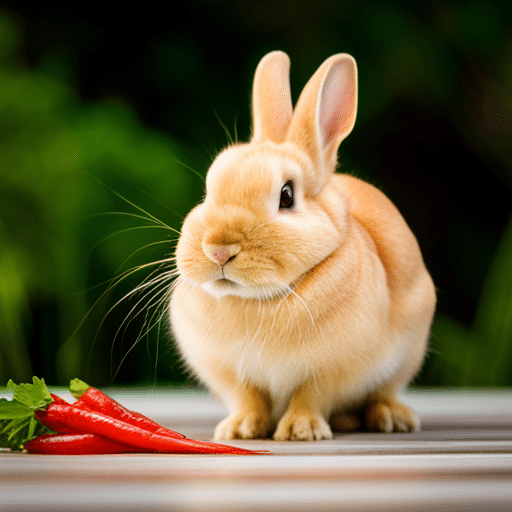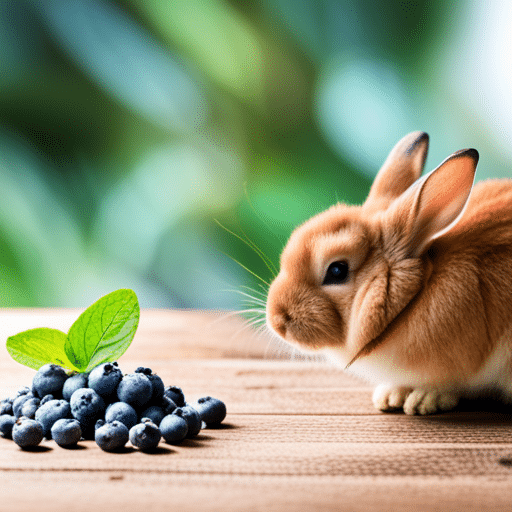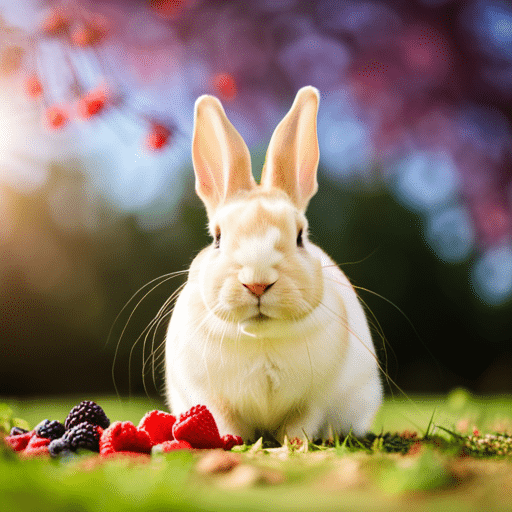Rabbits are often seen as small, cuddly pets, but their diet is actually more complex than many people realize. While many pet owners know that rabbits need hay and pellets to maintain good health, they may be less aware of the fruits and vegetables that can form part of a healthy rabbit diet. One such food item is blueberries, or blueberry plants which can provide a range of nutritional benefits for your furry friend. However, it’s important to understand the proper way to feed rabbits blueberries in order to ensure your pet’s well-being.
Introduction to Rabbit Diets
Rabbits are herbivores, meaning that they rely on plants and plant-based food sources for their nutrition. Hay should form the bulk of a rabbit’s diet, as it provides essential fiber and keeps the digestive system healthy. Pellets can also be fed to rabbits in order to provide them with a balanced source of vitamins and minerals. A small amount of fresh fruits and vegetables can also provide valuable nutrients, as well as mental stimulation. The types of food that rabbits should eat depend on their age; for instance, young bunnies may need more protein than older rabbits.

Understanding the Basics of a Healthy Rabbit Diet
It’s important to understand the basics of a healthy rabbit diet before introducing any new foods. As noted above, hay should form the bulk of your pet’s diet, as it is rich in dietary fiber. Pellets can be given in small quantities, but should not make up more than 10-15% of a rabbit’s diet. Fresh fruits and vegetables can also be fed to rabbits in order to provide a variety of essential nutrients. However, some foods are not suitable for rabbits, and it’s important to research the nutritional value of any potential food before offering it to your pet.
Common Misconceptions About What Rabbits Can Eat
One common misconception is that rabbits can eat any type of fruit or vegetable. While many fruits and vegetables are suitable for rabbits, some should not be fed, such as grapes, onions, potatoes, and rhubarb. It’s also important to avoid feeding your rabbit too much sugar-rich treats, as this can cause health problems over time for most rabbits. Blueberries are a great snack for rabbits, but should only be offered in moderation.
The Blueberry Question: Can Rabbits Eat Them?
The short answer to the blueberry question is yes, rabbits can safely eat this type of berry. Blueberries are a great snack for your pet; they provide a range of vitamins and minerals, as well as fiber. They also have a sweet taste that many rabbits enjoy. However, while rabbits can eat blueberries, it’s important to feed them in moderation, as too much sugar can cause health problems. When feeding your pet blueberries, it’s best to rinse them first and remove any stems or leaves. You should also avoid giving your rabbit large amounts of dried blueberries, as these can be difficult for rabbits to digest. If you’re unsure about how much blueberry is safe for your rabbit, consult a veterinarian for advice.
What Science Says About Rabbits and Blueberries
Research has shown that blueberries can be a beneficial part of a rabbit’s diet. In one study, researchers found that rabbits who were given blueberries along with their regular diet had lower levels of cholesterol and triglycerides in their blood. The bunnies also had better digestive health and fewer signs of inflammation. These findings suggest that feeding your pet rabbit blueberries can provide numerous health benefits.
Expert Opinions on Feeding Blueberries to Rabbits
Many experts agree that blueberries can have a positive impact on rabbit health. According to Dr. Karen Rosenthal, DVM, and lecturer at the University of Pennsylvania’s School of Veterinary Medicine, blueberries are an excellent source of antioxidants and dietary fiber for rabbits. She recommends feeding your pet fresh or frozen blueberries in moderation as part of a balanced diet. However, she also cautions against feeding your rabbit too much sugar, as this can lead to obesity and other health problems.
Nutritional Breakdown of Blueberries
Blueberries are rich in several essential vitamins and minerals, including vitamin C, vitamin K, and manganese. They also contain dietary fiber, which is important for keeping your rabbit’s digestive system healthy. Blueberries also have a low sugar content; one cup of fresh blueberries contains just 14 grams of sugar. This makes them an excellent snack for rabbits, as long as they are only fed blueberries in moderation.
What Makes Blueberries Healthy for Humans and Rabbits
Blueberries are a healthy snack for both humans and rabbits, as they contain antioxidants that can help protect against cell damage. They are also rich in dietary fiber, which helps to keep your pet’s digestive system running smoothly. Blueberries also have a sweet taste that many animals enjoy, making them an ideal treat for feeding rabbits too.
Translating Blueberry Nutrients to Rabbit Health
The vitamins and minerals found in blueberries can help rabbits maintain good health. For instance, vitamin C in blueberries plays a role in collagen production, which helps to keep skin and fur healthy. The manganese found in blueberries also helps support bone growth, while the dietary fiber supports optimal digestive health.
Benefits of Blueberries for Rabbits
Blueberries can provide numerous health benefits for rabbits. The vitamins and minerals found in blueberries help to boost your pet’s immune system, while the dietary fiber helps to keep their digestive system running smoothly. Blueberries also have a sweet taste that many animals enjoy, making them an excellent snack for rabbits. In addition, the antioxidants found in blueberries can help protect against cell damage, meaning that your pet can enjoy a snack without worrying about any negative health effects.

Antioxidant Effects and Rabbit Health
Antioxidants have been shown to be beneficial for both humans and animals, and blueberries are an excellent source of these compounds. The antioxidants found in blueberries can help protect against cell damage, which is especially important for rabbits as they age. Antioxidants in blueberry seeds also play a role in reducing inflammation, helping to keep your pet’s joints healthy and strong.
The Role of Fiber from Blueberries in Rabbit Digestion
Blueberries are a great source of dietary fiber, which is important for good digestive health. Fiber helps to keep the digestive system running smoothly, while also helping rabbits feel fuller after eating. This can help prevent obesity and other problems associated with overeating. Furthermore, the fiber in blueberries can help prevent constipation or gas in your pet.
Potential Risks and Side Effects of Feeding Blueberries to Rabbits
Although blueberries can be a healthy snack for rabbits, it’s important to feed them in moderation. Too much sugar from treats such as blueberries can lead to health problems over time. Additionally, some rabbits may not tolerate the high fiber content in blueberries, which can cause digestive upset or gas. It’s best to give your pet small amounts of blueberries at first and monitor them for any adverse reactions.
When Blueberries Become Dangerous for Rabbits
In some cases, blueberries can be dangerous for rabbits. If your pet eats large amounts of dried blueberries, it can lead to digestive issues such as bloating and gas. Additionally, too much sugar from treats such as blueberries can cause obesity and other health problems over time. It’s important to feed your rabbit fresh or frozen blueberries in moderation and avoid giving them large amounts of dried blueberries.
Signs of Blueberry Overconsumption in Rabbits
If your pet has eaten too many blueberries, it may display a few signs of overconsumption. These include gas, bloating, diarrhea, and vomiting. If you notice any of these symptoms in your rabbit after giving them too much fruit or blueberries, it’s important to stop feeding them the treat and contact a veterinarian for advice.
Proper Feeding Techniques for Rabbits
It’s important to feed your rabbit blueberries in moderation, as too much sugar can lead to health problems. Additionally, you should always provide fresh or frozen blueberries to baby rabbits instead of dried ones. When feeding blueberries to your pet, it’s best to give them one or two small berries at a time and monitor them for any signs of digestive distress. This will help ensure that your rabbit stays healthy and safe while enjoying a tasty treat!
How to Introduce Blueberries into Your Rabbit’s Diet
If you’re looking to add blueberries to your pet’s diet, it’s best to start slow and monitor for any adverse reactions. Begin by offering your rabbit one or two small berries at a time and waiting a few days between each feeding. If your pet has no problems with the treat, then you can gradually increase the amount of blueberries you feed them. It’s also important to remember to feed blueberries in moderation and avoid giving your pet large amounts of dried or sugary treats.
The Right Quantity: How Many Blueberries Are Safe?
When feeding blueberries to your rabbit, it’s best to offer them one or two small berries at a time. You should also keep in mind that too much sugar can lead to health problems over time; therefore, you should avoid giving your pet large amounts of dried or sugary treats. Additionally, some rabbits may not tolerate the high fiber content in blueberries, so it’s important to watch for any signs of digestive distress.
Other Berry Options for Rabbits
Blueberries aren’t the only type of berry that can be given to rabbits. Other safe options include raspberries, strawberries, blackberries, and cranberries. These berries are also packed with essential vitamins and minerals that can help keep your pet healthy. However, it’s still important to feed these treats in moderation and monitor your pet for any signs of digestive distress.

Healthy Alternatives to Blueberries in a Rabbit’s Diet
If you’re looking for a healthier alternative to blueberries, there are other fruits and vegetables that can provide essential vitamins and minerals for your pet. Some great options include apples, bananas, pears, carrots, spinach, and kale. These foods contain dietary fiber, which is important for good digestive health in rabbits. Additionally, these foods are low in sugar, which can help prevent obesity and other health problems associated with overeating.
Comparing the Nutritional Profiles of Various Berries for Rabbits
When choosing a berry for your pet, it’s important to compare the nutritional profiles of different types. Blueberries are an excellent source of dietary fiber, antioxidants, and other essential vitamins and minerals. Other berries such as raspberries, strawberries, blackberries, and cranberries also offer these health benefits but may vary in terms of their sugar content. It’s important to keep this in mind when deciding which type of berry to give your pet rabbit.
Conclusion: Balancing Diet for Optimal Rabbit Health
Blueberries are a healthy snack for rabbits that can provide essential vitamins and minerals. However, it’s important to feed them in moderation as too much sugar can lead to health problems over time. Additionally, some rabbits may not tolerate the high fiber content in blueberries, so it’s best to offer small amounts at first and monitor your pet for any adverse reactions. There are also other healthy options such as apples, bananas, pears, carrots, spinach, and kale that can provide essential nutrients for your pet rabbit.
Revisiting the Importance of a Balanced Diet for Rabbits
Overall, it’s important to remember that a balanced diet is essential for optimal rabbit health. This means providing your pet with a variety of fresh fruits and vegetables as well as hay and leafy greens on a daily basis. It also means feeding occasional treats, such as blueberries in moderation and avoiding sugary or highly processed snacks.
Making the Final Verdict: Can Pet Rabbits Eat Blueberries?
Yes, pet rabbits can safely eat blueberries in moderation. Blueberries are a great source of dietary fiber, antioxidants, and other essential vitamins and minerals. However, it’s important to feed them in small amounts at first and monitor your pet for any adverse reactions. Additionally, make sure to provide a variety of fresh fruits and vegetables as well as hay and leafy greens on a daily basis for optimal rabbit health.
By following these guidelines, you can ensure that your pet stays healthy and enjoys the occasional delicious treat!



